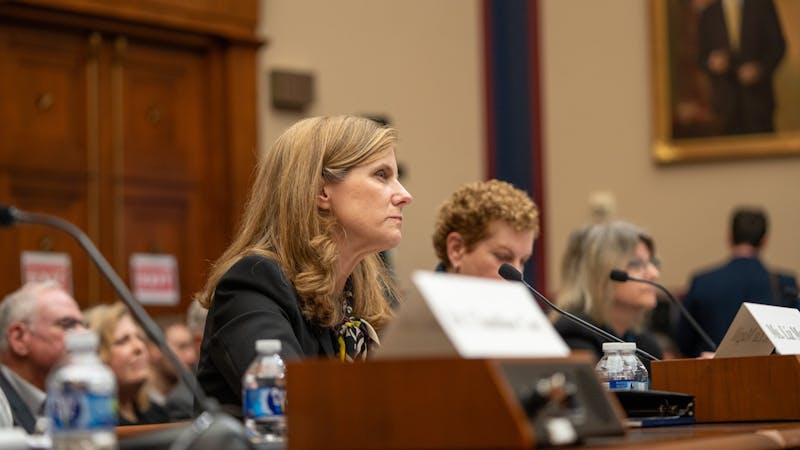
The United States House of Representatives is probing Penn’s tax-exempt status, citing an alleged “failure” to protect Jewish students on campus.
The House Committee on Ways and Means sent a letter to Interim Penn President Larry Jameson on Jan. 10 asserting that University leadership has failed to comply with the anti-discrimination laws that make them eligible for tax exemptions. The letter was also addressed to the presidents of Harvard University, Massachusetts Institute of Technology, and Cornell University.
Penn and other universities are tax-exempt entities under the Internal Revenue Code due to their educational mission focused on teaching, research, and public service. The Committee asserts that by inadequately addressing antisemitism, the four universities are failing to comply with anti-discrimination laws and remain focused on their educational mission, making them ineligible for tax exemptions.
“Penn will cooperate with the House Ways and Means Committee and share our continued work to keep our community safe and secure,” a Penn spokesperson wrote in a statement to The Daily Pennsylvanian.
The Committee on Ways and Means is the second House panel to probe Penn over its response to antisemitism, bringing the University into yet another encounter with the federal government. Penn is already being investigated by the United States Department of Education over alleged instances of antisemitism and Islamophobia, and the U.S. House Committee on Education and the Workforce launched an additional investigation in response to last month's Congressional hearing on antisemitism.
In the letter to Jameson, Committee on Ways and Means Chair Jason Smith (R-Mo.) asserted that the presidents of Penn, Harvard, MIT, and Cornell have failed to uphold their educational mission, adding that the committee is “concerned about the lack of an appropriate response and support for Jewish people and students.”
The letter references former Penn President Liz Magill's statements at an antisemitism hearing before Congress last month, where she was questioned for nearly five hours alongside former Harvard President Claudine Gay and MIT President Sally Kornbluth.
The letter requested that the four universities respond to a list of questions by Jan. 24. The questions relate to free speech policies, how university presidents make statements, the market value of university endowments and total taxes paid, protection of Jewish students on campus, and spending on DEI programming and initiatives.
In last month's hearing, Rep. Elise Stefanik (R-N.Y.) asked Magill if calls for the genocide of Jews constitute harassment. Magill responded that it would be a "context dependent" decision. Smith condemned Magill's response in the letter, stating that she and the other presidents failed to "condemn calls for violence or genocide against the Jewish community.”
“Given the disappointing and lackluster responses by your respective universities to Hamas’ attacks and your subsequent failure to adequately protect Jewish students from discrimination and harassment, we question whether your institutions are satisfying the requirements to receive these benefits,” he wrote.
Shortly after the hearing, Magill released a video expressing regret for her remarks and pledging to evaluate Penn's policies regarding hate on campus.
Smith also referenced “antisemitic conduct sweeping through college campuses” since Oct. 7, citing a Dec. 8 Fox 29 interview with College junior Kevin Bina. In the interview, Bina said that Jewish students at Penn "don't even feel comfortable walking outside wearing their kippahs because they don't know if they're going to be harassed."
The letter goes on to assert that the universities have “no problem” condemning other behavior as discrimination. Smith used Penn as an example, citing that the administration issued a warning threatening action against Penn students for violating its anti-discrimination policy by failing to use their classmates’ preferred pronouns.
The supporting article cited in the letter references an incident that occurred at Point Park University in Pittsburgh. No such instance has been reported at Penn.
Before her resignation, Magill had issued three statements related to antisemitism on campus.
On Nov. 1 of last year, Penn announced a University-wide action plan to combat antisemitism, anchored by the U.S. National Strategy to Counter Antisemitism. In the announcement, Magill wrote that “across the country and world, we are witnessing pernicious acts of antisemitism, including on college and university campuses.”
"I am appalled by incidents on our own campus, and I’ve heard too many heartbreaking stories from those who are fearful for their safety right here at Penn," she wrote. The plan includes several steps to improve safety and security, engagement, and education on campus.
The letter also accuses Penn and the other universities of protecting “preferred speech” and not all speech. It refers to the disciplinary proceedings initiated by the University against University of Pennsylvania Carey Law Professor Amy Wax. Wax has been accused of a “cumulative and increasing” promotion of white supremacy and discriminatory beliefs.
“The University of Pennsylvania did not hesitate to investigate and seek to strip tenure from a law school professor for holding controversial views, despite allowing professors who repeatedly denied Hamas’ worst atrocities and ‘romanticized the murder of over a thousand Israeli Jews’ to remain employed,” Smith wrote.
The letter also includes a pivot towards focusing on diversity, equity, and inclusion initiatives at Penn. Smith references a 2021 Heritage Foundation report claiming that campus DEI staff “are unwelcoming toward Jewish students." He said that DEI frameworks put Jewish students at risk and are counter to the universities’ missions.
The Daily Pennsylvanian is an independent, student-run newspaper. Please consider making a donation to support the coverage that shapes the University. Your generosity ensures a future of strong journalism at Penn.
Donate












